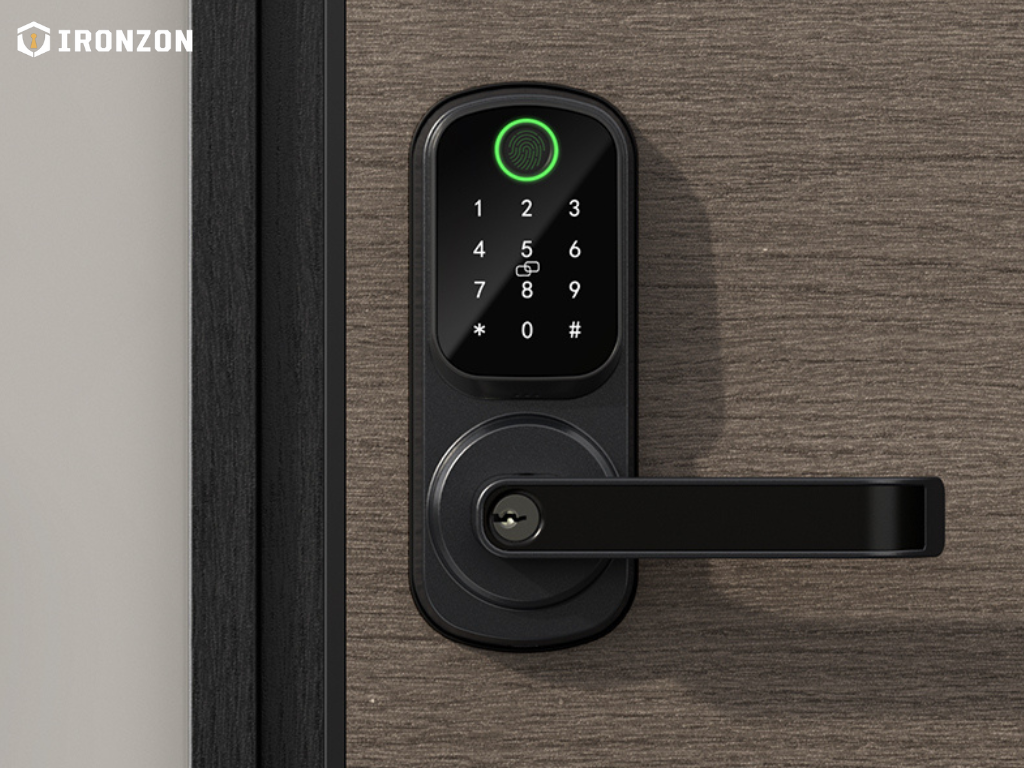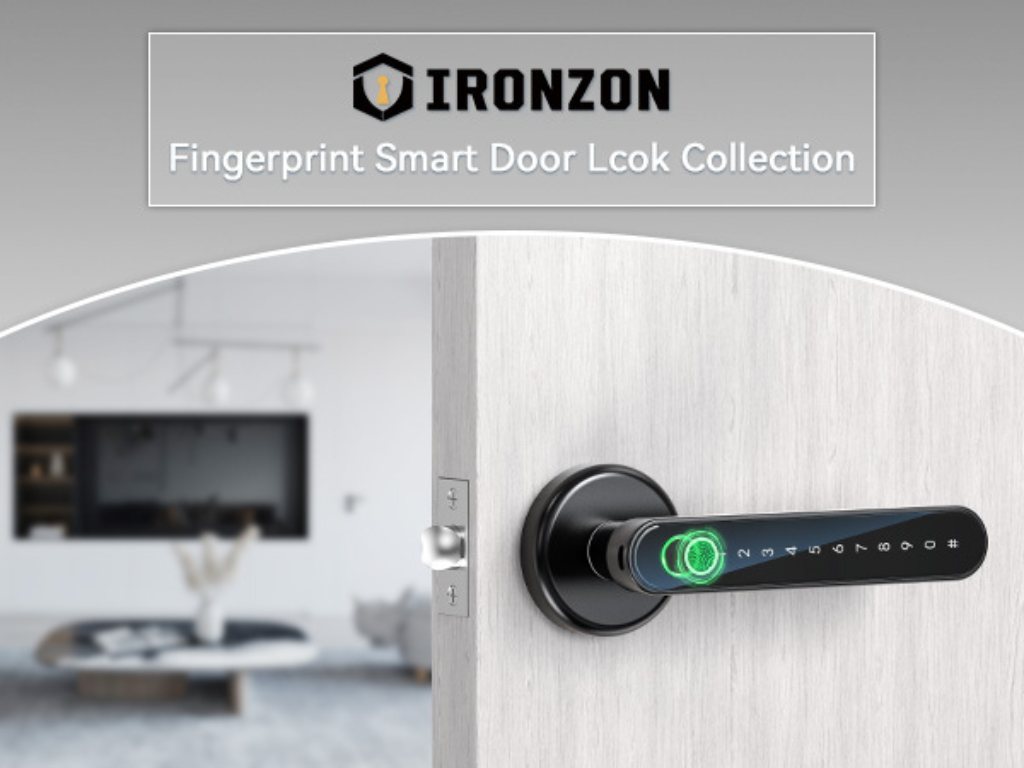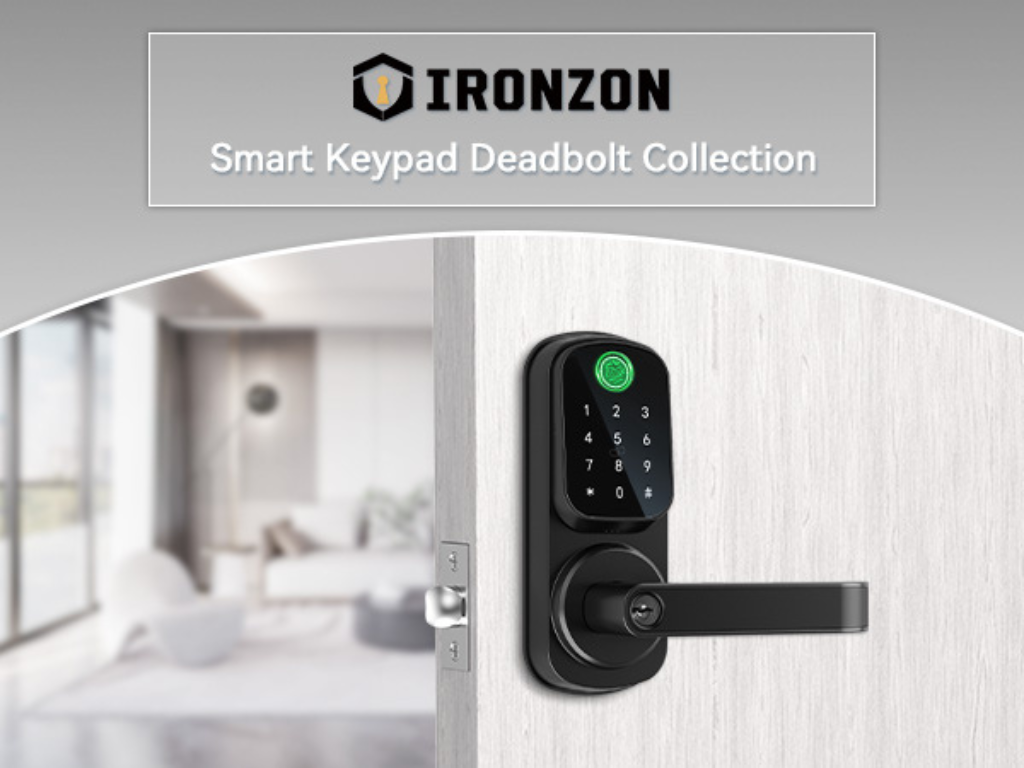In today’s technology-driven world, securing our homes has evolved with the advent of smart home devices. One of the most talked-about innovations is the smart door lock. In this blog, we’ll explore how smart locks compare to traditional locks, outlining the benefits and drawbacks of each to help you make an informed choice for your home security.
What Are Smart Locks?
Smart locks are advanced locking systems that eliminate the need for traditional keys, offering enhanced home security and convenience. IRONZON smart locks, for example, come with five different unlocking methods: fingerprint recognition, IC card access, keypad entry, traditional key, and app control (with a Tuya gateway for remote access). These smart home security devices utilize modern technology to provide flexible access control, ensuring that you can securely manage your home’s entry points.
Pros of Smart Locks:
- Convenience: IRONZON smart locks allow keyless entry using fingerprints, PIN codes, or an app, eliminating the need for physical keys. This is especially useful for families or rental properties where multiple people need access.
- Remote Access: With the addition of a Tuya gateway, you can lock or unlock your door remotely, making it easy to manage access even when you’re not home. This is perfect for granting access to guests or service providers without needing to be there physically.
- Multiple Access Methods: IRONZON smart door locks support multiple ways to unlock, catering to different preferences. Whether using a keypad, fingerprint, or key, users have flexibility, enhancing both convenience and security.
- Enhanced Security Features: Features like fingerprint recognition and encrypted app communication provide an extra layer of protection that traditional locks lack. By using biometric data, IRONZON smart locks add another level of defense against unauthorized entry.
Cons of Smart Locks:
- Power Dependency: Unlike traditional locks, IRONZON smart locks require power to operate, typically through batteries. However, if the battery runs out, there's no need to worry about getting locked out—IRONZON smart locks offer a solution by allowing you to use a Type-C charging cable for temporary power until the batteries are replaced. This feature ensures that your smart lock remains functional even when battery power is low, providing added convenience and peace of mind.
- Hacking Concerns: As with all connected smart home devices, there’s a small risk of hacking. It’s essential to maintain updated software and strong passwords to minimize any security risks.
- Connectivity Requirements: To unlock your smart lock remotely, you'll need a Tuya gateway and stable internet access, which adds to the setup requirements for full functionality.
What Are Traditional Locks?
Traditional locks, also known as key locks, have been around for centuries and rely on mechanical keys for operation. They have proven effective in securing homes, providing a simpler but reliable solution. However, they lack the advanced features that smart locks bring to modern-day home security systems.
Pros of Traditional Locks:
- No Power Needed: Traditional locks do not rely on batteries or electrical systems, so they are always functional. This makes them a simple, reliable option for those who don’t want to worry about power outages or battery replacements.
- Familiarity: Most people are comfortable using traditional locks, and they don’t require any additional setup or technology. Their straightforward design means there’s minimal learning curve involved.
- Affordability: Traditional locks tend to be cheaper than smart locks, making them accessible to a wider audience. However, the lack of additional security features may be a trade-off for the lower price.
Cons of Traditional Locks:
- Key Management: Physical keys can be lost, stolen, or duplicated, which poses security risks. Misplacing keys or having them copied without your knowledge is a significant drawback in today’s security landscape.
- Limited Access Control: Unlike smart locks, traditional locks don’t allow you to monitor or control who has access to your home remotely. You must physically give someone a key to grant them entry, which can be inconvenient.
- Vulnerability to Picking: Traditional locks are susceptible to lock picking or bumping, making them easier targets for break-ins compared to the high-tech security features found in smart door locks.
Smart Door Lock vs. Traditional Lock: A Comparison
Now that we've explored what each lock offers, let’s compare them across key factors:
- Convenience: Smart locks clearly win in terms of convenience. With keyless entry and remote control capabilities, IRONZON smart locks provide unmatched ease of access. You can grant or revoke access instantly from your phone or even set up temporary codes for guests.
- Security Features: IRONZON smart locks offer enhanced security through features like fingerprint recognition and encrypted app communication. Traditional locks, while reliable, lack these advanced technologies and are more vulnerable to traditional break-in methods.
- Cost: Traditional locks are more affordable, while smart locks have a higher upfront cost. However, the advanced features, added convenience, and enhanced home security offered by smart locks can make the investment worthwhile.
- Power Source: Traditional locks don’t require batteries or electricity, whereas IRONZON smart locks need periodic battery replacements to maintain full functionality. However, when the battery runs out, you have the option to either replace the battery or simply use a Type-C charging cable to recharge the lock. This ensures that even in unexpected situations, your smart lock remains functional without immediate need for battery replacement.
Factors to Consider When Choosing Your Lock
Choosing between a smart lock and a traditional lock comes down to your specific needs and lifestyle:
- Security Needs: If you’re seeking advanced security with multiple access methods and monitoring features, IRONZON smart locks offer a modern solution that integrates with your digital life.
- Convenience: For homeowners looking for easy keyless access, smart locks provide flexibility and control. Traditional locks, however, are better suited for those who prefer simple and familiar security methods.
- Budget: Smart locks, including IRONZON's models, are more expensive than traditional locks due to their advanced technology. However, their added convenience and enhanced security often justify the cost for many users.
- Compatibility: If you go for a smart lock, check the compatibility with your smartphone and other devices. IRONZON smart locks work seamlessly with the Tuya app, offering additional control and monitoring options with a Tuya gateway.
- Power Source: Smart locks rely on batteries or electrical power, whereas traditional locks operate without any external power source. If you prefer to avoid battery replacements, traditional locks may be a simpler choice.
Conclusion
Smart locks and traditional locks each offer unique benefits and limitations. IRONZON smart locks provide convenience, advanced features, and flexible access control, but they require battery maintenance and come at a higher cost. Traditional locks are simpler and more affordable but lack the flexibility and security features of modern smart locks. Ultimately, the choice between a smart door lock and a traditional lock depends on your specific security needs, budget, and desire for convenience. Whichever you choose, ensuring your home’s security is the top priority.



